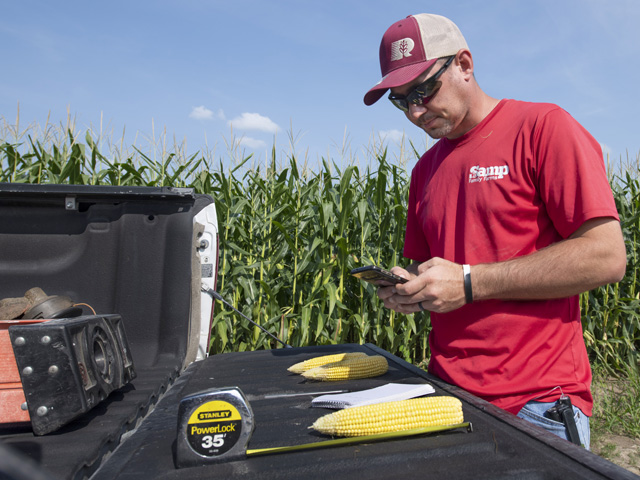FIRST Test Plot Hosts Sought for 2023
FIRST Test Plots Give Up-Close Look at How Latest Seed Offerings Perform on Your Farm
JEFFERSON CITY, Mo. (DTN) -- When you're in the market for a new pickup truck, you head down to the local dealership for a test drive. But what about when you're searching for a more productive corn hybrid or soybean variety for your farm? Where can you kick the tires on seed?
While most rely on the advice and expertise of their local seed representatives and company data when choosing hybrids and varieties, those who wish to get more hands-on have a unique opportunity through Farmers Independent Research of Seed Technologies (FIRST). Since 1997, the organization has offered growers an opportunity to participate in field trials for corn, corn silage and soybeans, allowing for timely, unbiased comparisons of seed genetics directly on the farm. FIRST is actively seeking test plot hosts for 2023.
"This year, we had 231 cooperating farmers and 320 test sites," said Jessie Prenger Bhalerao, FIRST program manager. "Many of the seed products entered in the tests are the up-and-coming products that companies are excited about, and the plot hosts get to see those new products first, on their own ground."
In 2022, a total of 1,200 corn products from 75 companies and 860 soybean products from 66 companies were included in the FIRST plot trials across 15 states -- North Dakota, South Dakota, Nebraska, Kansas, Minnesota, Iowa, Missouri, Wisconsin, Illinois, Indiana, Michigan, Ohio, Pennsylvania, Delaware and Maryland. Based on a host's location, a field trial may include anywhere from 30 to as many as 90 products.
Farmers who host a FIRST test plot location work with a regional field manager to flag a site that is typically 3 to 5 acres in size, depending on the crop and region. To minimize variability, sites must have good drainage with generally uniform soils.
P[L1] D[0x0] M[300x250] OOP[F] ADUNIT[] T[]
With the exception of seed, all inputs for the plot are supplied by the host, who agrees to share input and management details with FIRST. The field manager both plants and harvests the plot, coordinating with the host at season's end for hauling out the grain, which the host keeps.
Kyle Samp of Cairo, Missouri, has participated as a FIRST test plot host for the past four seasons, planting both corn and soybean trials. He said that while he and his father, Dale, are pretty committed to their current seed company and its products, the FIRST trials offer a benchmark for the hybrids and varieties they plant on their north-central Missouri farm.
"I work closely with my seed dealer, and he'll make sure to point out what's on the horizon with products in the trial, stuff that maybe we'll want to look at throwing in the lineup next year," Samp said. "That data is right there in front of you from your actual farm to see how it performs."
Bhalerao said some FIRST cooperators are able to suggest some of the seed that gets tested. If they provide the seed, they can coordinate with the regional field manager and include a couple of hybrids or varieties in the trials -- not only on their farm but also at other testing sites in the region.
"While it does require some extra work and coordination on the farmers' part, I've heard participants say that those 5 acres are the most profitable on the farm," she added. "However, seeing exactly how these products do on your own ground, that's the biggest benefit to the plots."
Samp -- who intends to participate again in 2023 -- agrees. He says that his FIRST field manager is conscientious when trying to work around their schedule on the farm to make everything work. He says that while the profitability on that handful of acres is greater, that's not where the true value lies.
"Sure, I don't have to run the planter or the combine through those acres, but the real value is the data and the information you can glean from it," he said. "Some years, it's been more helpful than others, but it's been my experience that I'd always rather have more information than less."
Corn and soybean yield and agronomic results are reported for each individual test site and as an average across all sites in the region. Typically, test results are reported within two days of harvest. To view this year's results to date, go to: https://www.firstseedtests.com/….
Bhalerao noted that more volunteers would be especially useful in the Dakotas and Nebraska. To volunteer to become a FIRST trial plot host, go to this link: https://www.firstseedtests.com/….
While not all volunteers will be contacted initially, weather and management changes in the spring sometimes prevent planned plots, Bhalerao said. FIRST will reach out when hosting opportunities arise.
Jason Jenkins can be reached at jason.jenkins@dtn.com
Follow him on Twitter @JasonJenkinsDTN
(c) Copyright 2022 DTN, LLC. All rights reserved.






